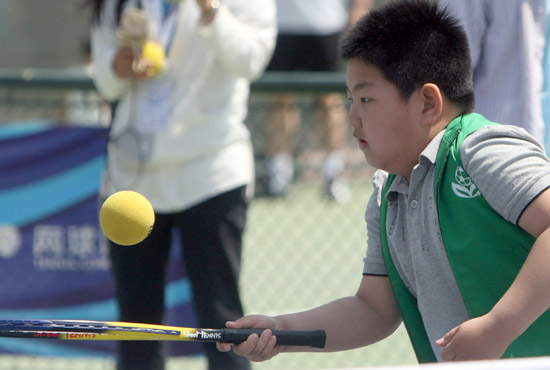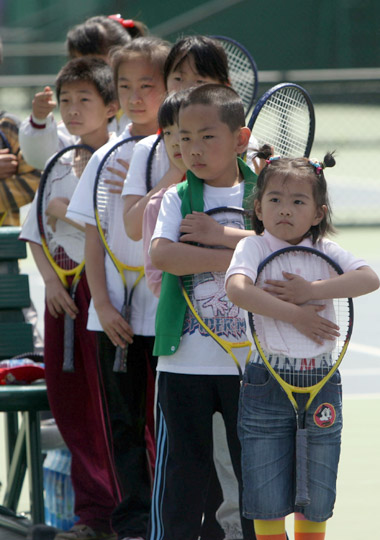Sports
Children rushing to serve after Li's victory
By Cui Jia (China Daily)
Updated: 2011-06-10
'Only the beginning'
 |
|
This youngster tries to get the feel of the racket against the ball at the promotional event in Tianjin. Provided to China Daily |
"Li's achievement validates the investment of everybody's time and energy every step of her way, and she laid the groundwork for China's young players," said Tom McCarthy, president of Beijing International Group (BIG), the official promoter of the China Tennis Association. "For China's tennis, it's only the beginning of climbing up the mountain, definitely not the top."
BIG has sponsored the "Swing for the Stars" junior tennis development program in China since 2008. The program has so far provided tennis training courses to about 2,500 amateur players who are 12 and younger - its primary focus - but also has reached more than 3,000 primary school students and about 30,000 university students nationwide.
According to the Chinese Tennis Association, the country has only about 500 registered tennis players between 12 and 18.
"The real result from Chinese young players requires patience," McCarthy said.
"Children from the Swing for the Stars program might not be able to perform internationally after eight years of training, but still you have to keep putting in the effort by getting them to play more matches internationally."
He said he doesn't expect Swing's school program to create real tennis stars in the future, but the students might want to continue playing recreationally because it is a fun game.
"After Li's win, some parents might consider taking their children to play tennis because now they know Chinese can be the world champion, too," he said. "Whether Li wants to be an inspiration or not, she has already inspired all young Chinese tennis players."
Children in China now can say they want to be Li instead of Liu Xiang, the 110-meter hurdles Olympic champion, or Yao Ming, McCarthy said. As more people are inspired to progress in tennis, the coaching business and sale of tennis-related products will certainly explode, he said.
'A new image'
 |
|
Tennis fever is expected to spread across the country among young players, like these in Tianjin at a promotional event sponsored by the International Tennis Federation last month. The federation said it takes only one hour to learn some basic playing skills. Provided to China Daily |
Sun Jinfang, director of the China Tennis Administrative Center, gave a thumbs up to Li and said she expects the champion to help ensure a greater future for Chinese tennis.
"This win is truly a breakthrough in a sport that has been dominated mainly by players from Europe, Australia and the Americas," she said. "It is a massive source of pride for all Asians and it can serve as a great milestone for the development of Chinese tennis.
"Li announced herself as a professional player by pulling off a great game and showing high morale. She is a new image for Chinese sports."
The China Tennis Association has long focused on the women's doubles game, and its efforts were rewarded by three Grand Slam titles - the 2006 Australian Open and Wimbledon (Yan Zi and Zheng Jie in women's doubles) and the 2008 Australian Open (Sun Tiantian with Serb Nenad Zimonjic in mixed doubles). And now there's a women's singles champion, too.
Tennis is considered an elite sport in China and, while the number of players is growing, it still is less played than basketball, football, table tennis and other sports. In Sun Jinfang's eyes, Li's win is a huge boost to change that.
"The victory can have a great effect on Chinese tennis. I'm sure it will lead to a re-evaluation of the sport and inspire more youngsters to play tennis," Sun said.
As Li said Saturday after her win, "I hope that lots of kids see my performance and in their hearts they feel that one day they can be like me and do even better than me."
Li's option
Li is a bit of a rebel who has had differences with the State-run sports system.
She argued that to breed world champions, China needed to give tennis players greater independence and financial incentives. She did say, however, that the State-run system benefited her greatly, since her own family was unable to cover the expenses of training and competing.
In 2008, the China Tennis Association introduced an experimental policy that allowed players to opt out of the State system. Li was permitted to choose her own coach and decide which matches to play, but she had to give 8 percent of her match winnings to the association.
Sun Jinfang told Xinhua on Thursday, "We can let go of the athletes when they show they are capable of flying alone. It's just like our children, who will one day grow up and get married. Li Na's success may encourage more people to follow her path."
Yu Yilei contributed to this report.
